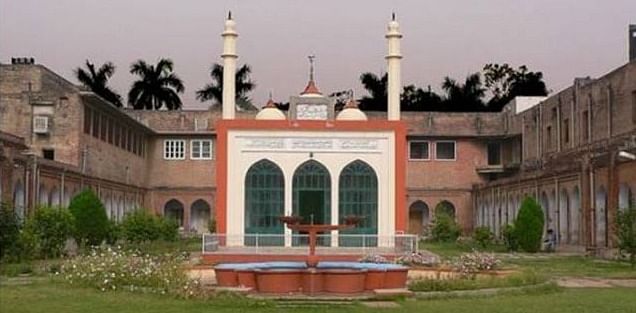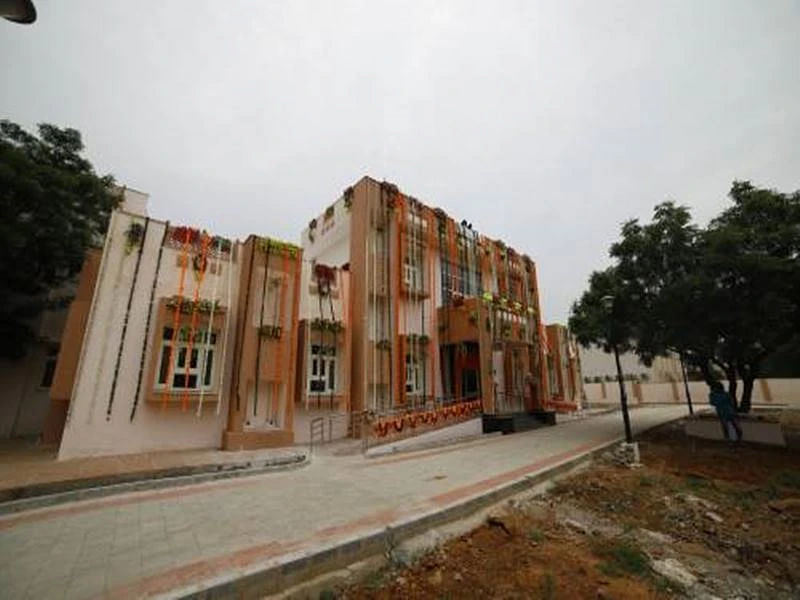B.Tech Petrochemical Engineering: Course Details, Eligibility, Fees, Admission

B.Tech Petrochemical Engineering is a 4-year undergraduate course that deals with basic knowledge of the petroleum refining process, production of hydrocarbons, and other petrochemical producing operations and offers practical exposure to petroleum extraction and byproduct formation. Upon completing this course, graduates receive various job opportunities across several domains.
Table of Contents
- About B.Tech Petrochemical Engineering
- Eligibility Criteria for B.Tech Petrochemical Engineering
- How To Get Admission for B.Tech Petrochemical Engineering?
- Popular Entrance Exams for B.Tech Petrochemical Engineering
- Top B.Tech Petrochemical Engineering Colleges in India
- Fee Structure for B.Tech Petrochemical Engineering
- Syllabus and Subjects for B.Tech Petrochemical Engineering
- Why Choose B.Tech Petrochemical Engineering?
- Preparation Tips for B.Tech Petrochemical Engineering
- Scope For Higher Education
- Salary of a B.Tech Petrochemical Engineer
- Career Options After B.Tech Petrochemical Engineering
- Skills That Make You The Best Petrochemical Engineer
B.Tech Petrochemical Engineering Course Details
| Degree | Bachelors |
| Full Form | Bachelor of Technology in Petrochemical Engineering |
| Duration | 4 Years |
| Age | No age limit |
| Minimum Percentage | 50% - 60% in 10+2 exam |
| Average Fees | ₹4 - 10 LPA |
| Average Salary | INR 8 LPA (Source: Payscale) |
| Employment Roles | Process Engineer, Control Engineer, Operations Engineer, Petrochemical Inspector, Instrumentation Engineer, Automation Engineer |
About B.Tech Petrochemical Engineering
Petrochemical Engineering provides a basic understanding of refining methodologies. It also offers scope for improvising the existing technology deployed for mineral extraction. B.Tech Petrochemical Engineering subjects include geology, petroleum exploration techniques, catalytic reaction engineering, production technology, etc. The petrochemical engineering syllabus helps students understand the petroleum extraction process. B.Tech Petrochemical Engineering is a popular course in India and abroad with a great job scope. Natural gas refining and petroleum refining industries employ graduates of this course. Around 70% of heavy machines worldwide depend on petroleum products.
Petrochemical engineers use their fundamental knowledge of geological science and chemical processes to:
- Conduct Research-based Studies on Fossil Fuels
- Industrial Equipment and Machinery
- Oil Extraction
- Site Survey
- Mining Electronics
- Research on Biogas
- Design of Extraction Plants
- Process Flow Management
- Byproduct extraction
Also, Check: Steps to Become a Chemical Engineer
Eligibility Criteria for B.Tech Petrochemical Engineering
Admission for the B.Tech Petrochemical Engineering course requires the aspirant to have secured a minimum of 50-60% aggregate marks in 10+2 with PCM as mandatory subjects. There are no age limits for pursuing this course as it is open to students who meet the required criteria. Along with basic criteria, students should clear any one of the national or state-level engineering entrance exams.
How To Get Admission for B.Tech Petrochemical Engineering?
Admission procedure for B.Tech Petrochemical Engineering course is done through merit based on their national and state-wise entrance exam scores. Aspirants must satisfy the minimum eligibility criteria, a combination of bachelor’s degree and entrance exam scores. The cutoff score would vary based on the college one chooses and the community they belong to. Some private colleges give admission through a limited management quota. The course falls under the umbrella of the B.Tech course and thus follows a similar admission process. The course falls under the umbrella of the B.Tech course and thus follows a similar admission process. Though the admission process varies from one university to another, some common admission steps are given below:
How to Apply?
Most colleges are taking their admission process entirely online due to the COVID-19 situation. Students must visit the official university website and provide the details and documents. For offline registration, visit the university premises, fill out the application form, and attach the required documents.
Selection Process
Once the application process is complete, some colleges may conduct a final counseling session or personal interview before confirmation of admission. Aspirants are offered this course based on their interest in the domain.
Read More on B.Tech Admission
Popular Entrance Exams for B.Tech Petrochemical Engineering
Petrochemical engineering is a geology-based course that is in high demand. There are several national or state-level examinations for the selection process. Based on their entrance exam scores and board marks, students are taken in through merit quota.
The cutoff scores vary from one college to another. Students who have completed their 10+2 education with PCM as compulsory subjects are eligible to participate in these entrance exams.
The entrance exams for B.Tech Petrochemical Engineering are generic. The questions asked for the entrance exams are mainly from the 10+2 PCM syllabus and fundamental qualitative analysis. Students can choose the colleges they would like to get admitted to based on their cutoff scores. The following are some popular engineering entrance exams:
A Quick Glance at the B.Tech Petrochemical Engineering Entrance Exams
The above-mentioned examinations' eligibility criteria depend on the conduction body. There will be a tremendous amount of variation from one exam to another. However, there is a standard pattern that can be concluded from analysing some popular entrance exams:
- The exam pattern includes logical, reasoning, and problem-solving questions. The mode of the test could be both online or offline.
- The questions would be of objective type. Most of the questions are expected from fundamental science subjects covered in the 10+2 grade.
- The maximum duration of the test is two-three hours approximately depending on the exam.
- The syllabus, method of examination, and question pattern may vary according to a university/conduction body.
Top B.Tech Petrochemical Engineering Colleges in India
Below is the list of the ten best B.Tech Petrochemical Engineering colleges in India, according to NIRF:
| NIRF Ranking | Top colleges for B.Tech Petrochemical Engineering |
| 1 | IIT Madras |
| 2 | IIT Bombay |
| 12 | IIT Dhanbad |
| 14 | Anna University Chennai |
| 69 | Andhra College of Engineering Vizag |
| 50 | College of Engineering Pune |
| 167 | UPES Dehradun |
| 177 | Pandit Deendayal Petroleum University Gandhinagar |
| 134 | Rajiv Gandhi Institute of Petroleum Technology Amethi |
Fee Structure for B.Tech Petrochemical Engineering
The course fees for B.Tech in Petrochemical Engineering vary from one university to another. The factors that determine the difference are college infrastructure and facilities. The average course fees for B.Tech Petrochemical Engineering range from INR 4 - 10 LPA. Students can pay the fees semester-wise, and in some cases, they can pay annually.| S.No | College | Fee Structure |
| 1 | Andhra University | INR 3.2 Lakhs |
| 2 | Anna University | INR 2 Lakhs |
| 3 | UPES Uttarakhand | INR 9.1 Lakhs |
| 4 | Pandit Deendayal Petroleum University | INR 9 Lakhs |
Syllabus and Subjects for B.Tech Petrochemical Engineering
B.Tech Petrochemical Engineering course comprises a choice-based credit system. This allows the students to opt for their respective elective subjects. The credit system also includes core topics of the course. The course structure combines core subjects, electives, lab work, and industrial projects. The generic syllabi which will be covered during the course are listed below:
- Materials Technology
- Organic Chemistry
- Refining Operations
- Heat Transfer
- Natural Gas Engineering
- Petroleum Production Engineering and Design
- Surface Production Operations
- Catalytic Reaction Engineering
- Fluids and Solid Operations
- Enhanced Oil Recovery Techniques
- Petroleum Equipment Design
Read More: B.Tech Petrochemical Engineering Syllabus and Subjects
Why Choose B.Tech Petrochemical Engineering?
Petrochemical engineering has been one of the most sought engineering courses in India. It offers diverse job opportunities and specialisations leading to its popularity. The answer to "Why choose B.Tech Petrochemical Engineering?" can be made simpler by breaking it down to the following three short questions:
What is B.Tech Petrochemical Engineering All About?
B.Tech Petrochemical Engineering is a 4-year undergraduate course that focuses on the principles of organic chemistry, math, and other engineering subjects. Some of the core subjects include instrumentation, mechanical design, control system, mass transfer, and thermodynamics. The syllabus prepares aspirants with adequate knowledge of the extraction and refining process. B.Tech Petrochemical Engineering graduates have a broad job scope wherein they can be employed as chief petroleum engineers, offshore drilling engineers, and operations managers.
What Does a Petrochemical Engineer Do?
B.Tech Petrochemical Engineering students have various job opportunities to pursue. Some of the most common work areas are oil extraction sites and the petroleum industry. Let us now understand the functions of a petrochemical engineer:
Research and Development: Petrochemical engineers need to develop new solutions to cater to the demands posed by depleting resources. Graduates are also expected to implement new solutions that supersede its predecessor's efficiency.
Pipe Flow Designing: Petrochemical engineers lay down bridge designs to flow minerals and fluid from one place to another. Pipe flow design is crucial in extraction sites.
Safety Management: Petrochemical engineers also have the responsibility of ensuring the safety of the extraction site. As a safety manager, they play a vital role in implementing standard operating procedures.
Technology and Business Solutions: Petrochemical engineers also work in technology and business solutions. They primarily work in petroleum software management for clientele. They also take up analyst roles to monitor the production rates.
Project Management: Petrochemical engineers should possess the capability of efficient team management. They are required to estimate an appropriate cost-benefit analysis of the project. Along with that, they also need to present trends of progression for the project.
Reasons Why Petrochemical Engineering Can Fetch You a Rewarding Career?
B.Tech Petrochemical Engineering is a stream that has high demand in the job market. Among other chemical engineering specializations, petrochemical engineering has the most luxurious job scopes. The factors that make petrochemical engineers have a long stand in the job market are :
Demand: The constant need for petroleum-based products has created a substantial market for petrochemical engineers. The petroleum industry offers high potential for technically sound engineers. Petrochemical engineers get stable job opportunities in the longer run.
Higher Payscale: Petroleum engineering always has a more significant say in the job market. It is due to the importance of petroleum in day-to-day operations. The average salary of a B.Tech Petrochemical Engineer in India is 8 LPA. Graduates can receive the highest package of 12 LPA, which is dependent on the experience and the skillsets of the employee.
Besides, there are enormous opportunities for graduates in countries like UAE, Germany, Oman, USA, Qatar, etc.
Read More: B.Tech Petrochemical Engineering Jobs and Scope
Preparation Tips for B.Tech Petrochemical Engineering
Below are some preparation tips made by experts for aspirants who want to pursue B.Tech in Petrochemical Engineering :
- Know the Syllabus: Get to know the syllabus to focus on essential areas during the lectures and examinations.
- Make a Plan: Make a study plan according to the syllabus and cover it before exams.
- Strengthen Fundamentals: Students must have a strong fundamental knowledge required. Brush up 10+2 basics regularly.
- Keep Updated: Students must be updated on the recent developments in petrochemical engineering and find their niche.
Scope For Higher Education
Petrochemical engineering graduates have plenty of options to choose for higher education. Graduates can choose from short-term diploma courses to full-time post-graduation courses. Apart from technical fields, graduates can also take up business management degrees.
Some of the popular M.Tech in Petrochemical Engineering entrance exams in India include GATE, OJEE, IPU CET, SRMJEEE PG, etc. Some of the courses after B.Tech Petrochemical includes:
- MBA
- M.E Petrochemical Engineering
- M.Tech Petrochemical Engineering
- M.Sc Petroleum Engineering
- Ph.D. Petroleum Engineering
Salary of a B.Tech Petrochemical Engineer
The average salary of a B.Tech Petrochemical engineer is 8 LPA in India. This value varies depending on the city, years of experience, the job role, etc.
A B.Tech Petrochemical Engineering fresher can earn somewhere between INR 4 - 8 LPA. Some of the common job roles include junior project engineer, chemical engineer, drilling engineer, junior reservoir engineer, etc.
Read More: B.Tech Petrochemical Engineering Salary
Career Options After B.Tech Petrochemical Engineering
After completing B.Tech in Petrochemical Engineering, one can work in both public and private sectors. Graduates take up the role of a petrochemical engineer at several oil refineries and petroleum extraction sites. They also take up technician roles in live sites and R&D organizations. Listed below are the popular industries that employ Petrochemical Engineering:
- Shipping Industries
- Automobile Industries
- Crude oil extraction sites
- Thermal power plants
- Aerospace Industries
- Chemical Industries
- Machinery manufacturing
Listed below are the public sectors that offer employment for electrical engineers in India.
- Oil and Natural Gas Corporation (ONGC)
- Bharat Petroleum
- Indian Space Research Organisation (ISRO)
- GAIL
- Indian Oil Corporation (IOC)
- BHEL
Skills That Make You The Best Petrochemical Engineer
Petrochemical engineering is an entirely specialized engineering domain with multiple job scopes. They are highly skilled to work in several fields under mineral extraction industries. Graduates play a vital role in the planning and production of petrochemical products. Petrochemical engineers must be technically sound in the oil refining process. They should also be actively involved in designing mechanisms for extracting minerals.
Apart from private organisations, graduates are also in demand at numerous government enterprises. Some of the skills that make will make one the best petrochemical engineer are listed below:
- Market Awareness
- Team Working Skills
- Communication Skills
- Man Management
- In-depth Technical Knowledge
- Problem-solving Skills
- The Ability To Work Under Pressure
- Adaptability To Situations
- Hands-on Experience
Check other important B.Tech Courses
Top B.Tech Petrochemical Engineering Colleges
Top Engineering Entrance Exams
B.Tech Petrochemical Engineering Fee Structure
FAQs on B.Tech Petrochemical Engineering
Q: What is the scope of Petrochemical Engineering in India?
Q: What is the future of Petrochemical Engineering?
Q: What do Petrochemical Engineers do?
Q: Which is the better one Chemical or Petrochemical Engineering?
Q: Is Petrochemical is equivalent to Chemical Engineering?
























